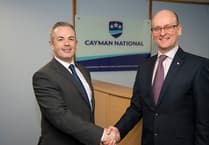Have you ever given any thought to what sort of funeral you would like? Probably not, because death is something we have tended to like talking about, despite its inevitability.
But now, an increasing number of people are starting to question whether a traditional funeral is actually the way that they want to have the end of their lives marked. Not to mention the cost of it. Tracy Corlett wants to give people on the island an alternative that is already becoming popular in the UK with her new business, Direct Cremation Services.
She says: ‘The coronavirus pandemic and associated restrictions for attending funeral services changed the cultural shift with the acceptance of less formal and unattended funerals.
‘A direct cremation is an affordable and simple cremation with no funeral service. There is no hearse or limousines, no expensive coffin, no viewing at the chapel of rest and no mourners.’
It’s already becoming a popular alternative in the UK and a recent survey showed that, although direct cremation is often marketed as a ‘cheaper’ option, there is a lot more going on than just financial considerations. Evolving rituals and consumer behaviour might matter even more than cost as people want to mark the end of a loved one’s life in a way that’s more personal to them, rather than conforming to social norms.
Tracy, who has been working for an insurance company for the last 19 years, had the idea when she was doing some training with funeral directors as part of her role. The first people she ran it by were her parents, who are both in their eighties.
She says: ‘It’s a subject that a lot of people don’t like talking about but it is a part of life and it’s something that I’ve always discussed with my parents. They were very supportive and wanted to know more, so I knew their views and what they wanted, and I thought: “Yes, it will help people”.’
The results of the UK study challenge the assumption that holding a funeral service on the day of a funeral is beneficial to mourners. The death of a loved one can give the feeling of vulnerability to those grieving and a lot of pressure on mental health can be attributed to trying to plan a funeral whilst in a state of grief.
Tracy believes that the idea that direct cremation might be a kinder way for people having to deal with the death of a loved one makes a lot of sense.
She says: ‘It’s a time when you’re grieving, you’re drained anyway through the grieving process, and it’s difficult to think of everything you need to organise and the people that you need to tell.’
The way her direct cremation service will work is quite different and very simple.
Once a death has been registered, Tracy’s team will collect the body in a private ambulance.
They then place it in a simple wooden coffin and take it to the crematorium. Afterwards, the relatives of the deceased will receive the ashes and they can then take their time to decided what sort of memorial ceremony they want to have.
Tracy says: ‘They can have a celebration of life: they can scatter their ashes when and where they want, or they can arrange to plant a tree – they can do it in their own time.’
It also helps when someone dies in the island and arrangements need to be made for friends and relatives to travel here for a memorial, or to take part via a live stream.
Although cost appears not to be the driving factor for people choosing a direct cremation, the saving is significant.
Tracy reckons it is around half the price of a traditional funeral where the average cost, excluding professional fees and any extra expenditure, is estimated at a more than £4,000.
Tracy says: ‘I thought the island needed something that helps with the financial crisis. T he cost of living is high at the moment anyway and the cost of dying is also high.’
And, despite her business being very new off the blocks she adds that she is already getting a lot of enquiries: ‘It seems to be the way things are going,’ she says.




-(1).jpeg?width=209&height=140&crop=209:145,smart&quality=75)